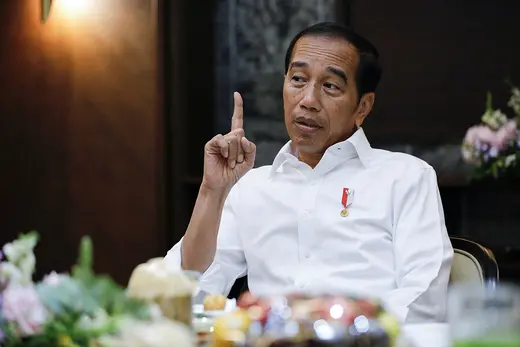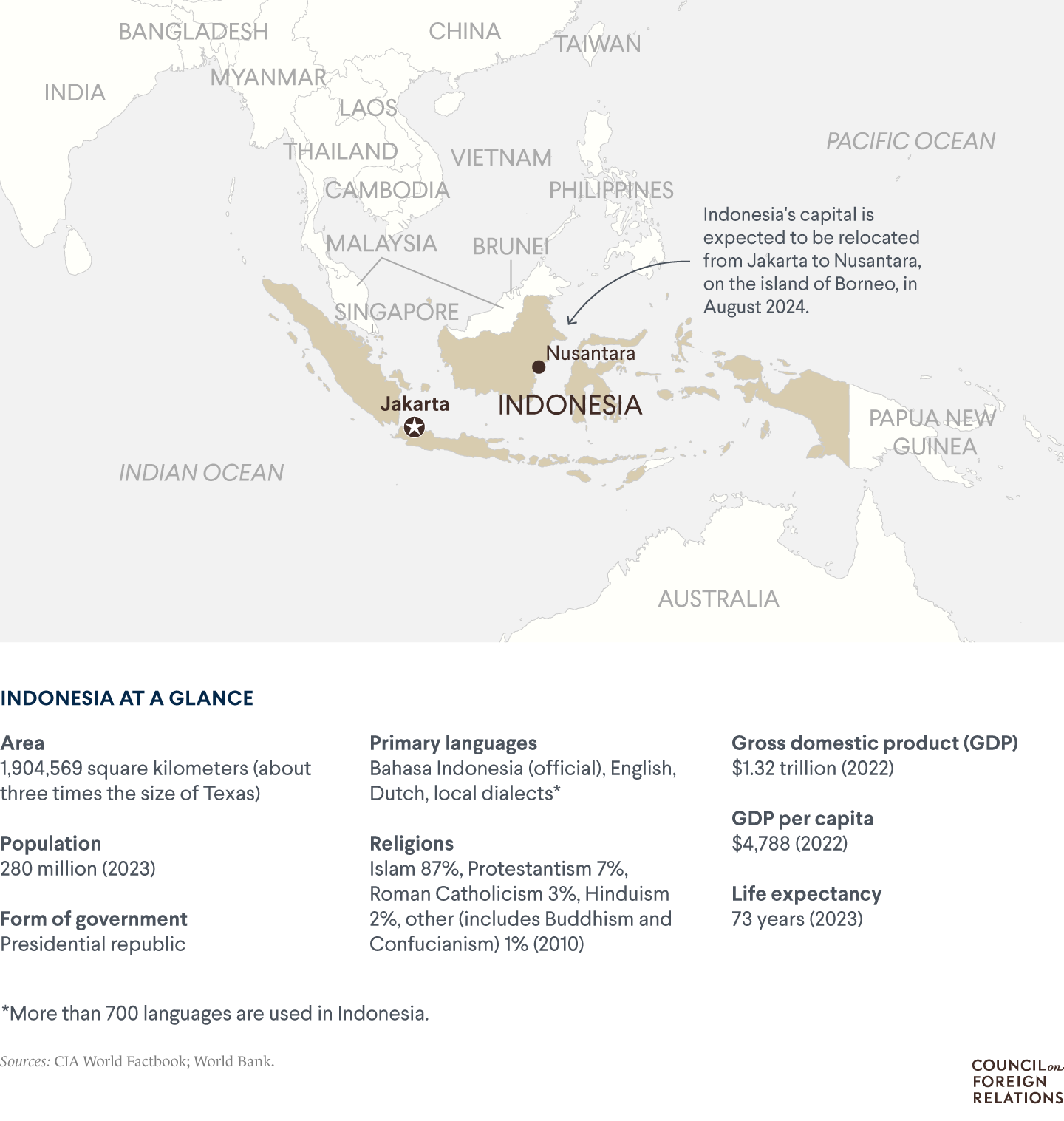Indonesia’s Presidential Election: The Old Guard Faces the New
The February 14 election marks a potential turning point in Southeast Asia’s most powerful state, likely determining its future relations with China and the United States, and the fate of the country’s own democracy.
By experts and staff
- Updated
Experts
![]() By Joshua KurlantzickSenior Fellow for Southeast Asia and South Asia
By Joshua KurlantzickSenior Fellow for Southeast Asia and South Asia
President Joko Widodo, popularly known as Jokowi, cannot run for a third term under the Indonesian constitution, but he has meddled extensively in the run-up to the upcoming election. What have been the effects of his actions?
It seems likely that his actions have dramatically altered the race and possibly even decided it—to the detriment of Indonesian democracy. When first elected in 2014, Jokowi was touted as a democratic reformer. A former middle-class small businessman, he was the first president of the democratic era not to come from the Jakarta elite or have links to the repressive period when President Suharto ruled. Jokowi promised to expand rights, fight corruption, boost the economy, and refrain from building a family dynasty, as such dynasties had overshadowed the country’s politics, and still do.
Although Jokowi secured reelection in 2019—largely due to his successful economic policy—he has failed in virtually every other policy area. Indonesia has backslid on upholding democratic rights, and he also has allowed the army, notorious in the Suharto era for its brutality and involvement in national politics, to meddle extensively in domestic affairs, taking greater control of many critical ministries. Additionally, he has undermined the anticorruption watchdog and made alliances with some of the country’s most venal and archaic politicians.

Most notably, he appointed as defense minister Prabowo Subianto, accused by many watchdog groups as having a terrible human rights record. For years, this cost Subianto a visa to enter the United States. President Jokowi now is de facto supporting the seventy-two-year-old Prabowo, a member of the long-ruling older elite, in the 2024 presidential race, rather than the candidate from Jokowi’s own party. Not coincidentally, Prabowo has named Gibran Rakabuming Raka, Jokowi’s thirty-six-year-old son and the current mayor of Solo, Jokowi’s home base, as his running mate. Without links to the president, Gibran would have been seen as too inexperienced to run for vice president; he already has made several gaffes.
Indonesia’s top court, headed by Jokowi’s brother-in-law, had to issue a special ruling to allow someone Gibran’s age to run for vice president. In pushing forward Gibran (and another, younger son, who is running for a mayoralty), Jokowi has effectively torn up his “no dynastic politics” pledge as well.

Who are the main candidates in the race?
There are three major candidates, but polls show Prabowo with a clear lead. One respected poll released this week projects he will win over fifty percent of vote in the first election round, which would grant him presidency without a runoff election. Prabowo’s candidacy has been bolstered by Jokowi’s de facto endorsement—the president is a skilled politician and maintains strong popularity despite his democratic shortcomings. Many voters seem to view a Prabowo presidency as akin to a Jokowi third term. In fact, Prabowo’s popularity has grown since he appointed Jokowi’s son as his running mate.
Meanwhile, Prabowo’s two main, much younger, rivals have struggled to define themselves as candidates, although they did better in the most recent presidential debate. Ganjar Pranowo, a former governor of Central Java who is decades younger than Prabowo, is backed by the most powerful party but has failed to cultivate a clear identity. The other major candidate, former Jakarta Governor Anies Baswedan, will likely draw a large portion of the growing base of more conservative Muslims voters, but he has focused intently on attacking Jokowi and Prabowo, which does not seem to be boosting Anies’s standing.
How would a win by Prabowo affect Indonesia’s democracy, given his past rights record and, at times, demonstrated disdain for democracy?
As defense minister, Prabowo is trying to cultivate a softer public image. But the ex-military man and former son-in-law of Suharto stands widely accused of overseeing abductions of pro-democracy activists and masterminding atrocities in the then province of East Timor, which occurred in the late 1990s. In an interview with Radio Australia, former U.S. Ambassador to Indonesia Robert Gelbard described Prabowo as “somebody who is perhaps the greatest violator of human rights in contemporary times among the Indonesian military.”
In his prior presidential campaigns, Prabowo portrayed himself as an populist strongman, vilified minority groups with divisive rhetoric, and pushed to eliminate some regional and local elections in Indonesia. Prabowo has close ties throughout the armed forces and has presented himself as a leader out of Indonesia’s autocratic and dynastic past; he could well shatter Indonesian democracy and govern like a Javanese authoritarian populist as president. Other contenders, who have been more committed to democracy, have tried to attack Prabowo for his past rights record and seeming disdain for democracy. Ganjar asked him whether he would investigate past human rights abuses so that victims’ families could have closure, but Prabowo responded dismissively, telling his opponent not to “politicize” the issue of human rights.
How would a Prabowo presidency influence Indonesia’s relations with China, which has expanded its investment in Indonesia under Jokowi?
Jokowi, like many Southeast Asian leaders, has sought a delicate balance with China and the United States. Jokowi has made upgrading Indonesia’s poor infrastructure a major priority of his two terms, viewing it as key to boosting growth. To obtain better infrastructure, he has aggressively cultivated Chinese aid and investment, perhaps more so than any other leader of a large Southeast Asian economy. But at the same time, he and his military advisors have become more concerned in recent years about China’s activities in Indonesian territorial waters, so he also has expanded defense cooperation with the United States.
Prabowo, more knowledgeable about regional security affairs than Jokowi, would likely take a more assertive approach toward China’s maritime actions, and seek to make Indonesia a much more powerful security actor regionally and on the global stage. As a longtime nationalist, Prabowo thinks Indonesia deserves a much bigger role in global institutions and would push to give Indonesia stronger input at major global meetings such as the Group of Twenty (G20), the Asia-Pacific Economic Cooperation (APEC) summits, and other similar events. Prabowo recently reflected concerns about Beijing’s maritime behavior by praising the AUKUS submarine deal, a trilateral partnership between Australia, the United Kingdom, and the United States. However, has also said he wants to continue Jokowi’s strategy of cultivating relationships with both the United States and China. But Prabowo is blustery, the opposite of the controlled and sometimes introverted Jokowi.
The other two main contenders, meanwhile, have criticized the Jokowi-Prabowo administration for aggressively wooing Chinese investment, and have suggested they would try instead to diversify investment partners. Yet, neither have foreign affairs experience, and it remains unclear how they would diversify the Indonesian economy’s inbound investment flows. They have not clearly enunciated new ideas for addressing U.S.-China competition in the region.
How could the elections affect Indonesia’s relationship with the United States and major U.S. partners in Asia, such as the Association of Southeast Asian Nations (ASEAN), where Indonesia is the most powerful country?
Prabowo would certainly try to reclaim Indonesia’s central role, even dominance, in ASEAN, which has diminished as Jokowi has paid less attention to the organization. Prabowo would also likely upgrade U.S.-Indonesia defense cooperation. According to U.S. officials, he has been working well with the Pentagon while Indonesia and the United States have recently built a tighter security relationship. Whether the other contenders would do so remains unclear. Anies’s base is not fond of the United States, and Ganjar is very inexperienced in foreign affairs, though both candidates would also try to reclaim Indonesia’s central role in ASEAN.
Prabowo would also probably upgrade security links with Japan, which has become increasingly assertive in building defense ties with Southeast Asian states such the Philippines and Vietnam, and potentially in providing these countries with military aid. However, his alleged past abuses—and potential to turn toward authoritarian populism if elected—could slow cooperation with the United States, especially because there are some in Congress (and many in the Indonesia-watcher community) who are clearly worried about Prabowo’s ambitions. Even if Prabowo upheld democracy and upgraded security ties with Washington, he has said he would maintain Indonesia’s desire to have close relationships with all major and middle powers, and almost surely would not go as far as Philippine president Ferdinand Marcos Jr. has, in clearly tilting away from China.
This publication is part of the Diamonstein-Spielvogel Project on the Future of Democracy.
